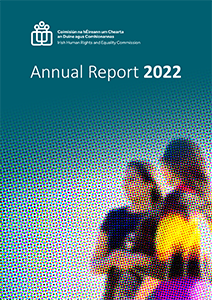 This Annual Report covers the first year of our Strategy Statement 2022- 2024. It sets out our activities during 2022 to advance each of the Commission’s five strategic priorities:
This Annual Report covers the first year of our Strategy Statement 2022- 2024. It sets out our activities during 2022 to advance each of the Commission’s five strategic priorities:
- Economic equality
- Justice
- Respect and recognition
- Futureproofing
- Public Sector Duty
Highlights include:
Direct Public Queries to our Your Rights service
In 2022 we saw 1,411 public queries on human rights and equality issues handled by the Commission’s Your Rights service.
Of the public queries to us:
- The top public concerns related to the Equal Status Acts, focused on discrimination on the grounds of disability (42%), race (16%), gender (8%) and age (8%).
- The top public concerns under the Employment Equality Acts focused on discrimination in employment and job seeking on the grounds of disability (39%), gender (16%) the race ground (12%) and age (12%).
- The top three public concerns in relation to human rights focused on asylum and immigration (22%), homelessness, social housing and living conditions (16%), and health and bodily integrity (12%).
Legal Activity
- We sought liberty to intervene in 6 new sets of proceedings, as amicus curiae (friend of the court) across a range of important human rights and equality questions, and we were granted leave to intervene in all of them. The cases focused on Traveller accommodation, the right to a fair trial, redress for sexual abuse in day schools, disability rights and citizenship.
- We used our legal powers widely, including our involvement as a third party intervener in a case before the European Court of Human Rights in Strasbourg.
- Two Codes of Practice, prepared by the Commission, including, a Code of Practice on Equal Pay; and a Code of Practice on Sexual Harassment and Harassment at Work were launched by the Minister for Children, Equality, Disability, Integration and Youth.
IHREC as Independent National Rapporteur on Human Trafficking
We published our first Evaluation of the Implementation of the EU Anti-Trafficking Directive Report on the State’s actions to combat human trafficking. The report provides in-depth analysis of Ireland’s compliance with the Directive, and evaluates the State’s implementation efforts, with a view to establishing good practice approaches as well as identifying areas in need of improvement and reform.
Legislative observations
We made 11 legislative observations to the Oireachtas covering a diverse range of topics, including hate crime, inspection of places of detention, school admissions, safe access zones, Garda Síochána powers, Mother & Baby Homes payment scheme, and disability rights.
Influencing Policy and Practice
We made specific recommendations to Government and policy makers on An Garda Síochána Human Rights Strategy, the Referendum on Housing in Ireland, Junior Cycle SPHE Short Course Curriculum, changing gendered language in the Constitution and Welfare Indexation, the practice of linking social welfare payments in line with inflation.
We brought forward new research on the discrimination Housing Assistance Payment tenants face in accessing rental accommodation.
Funding of €400,000 was provided through the 6th year of our Human Rights and Equality Grants Scheme to 32 projects nationally.
Monitoring Ireland’s Compliance with International Obligations
The Commission made recommendations to the UN Human Rights Council and to the Council of Europe on Ireland’s international obligations in relation to:
- UN Convention on preventing and combating violence against women and domestic violence
- UN International Covenant on Civil and Political Rights
- UN Convention on the Elimination of All Forms of Racial Discrimination
- UN Convention on the Rights of the Child
- European Social Charter
A Commission delegation attended the UN Civil and Political Rights Committee’s review of Ireland in Geneva in July 2022.
Implementing the Public Sector Equality and Human Rights Duty
1800 public servants across 181 public bodies availed of our new online learning module to support public servants with an understanding of equality, human rights, the obligatory Public Sector Equality and Human Rights Duty and how to apply it in their work.